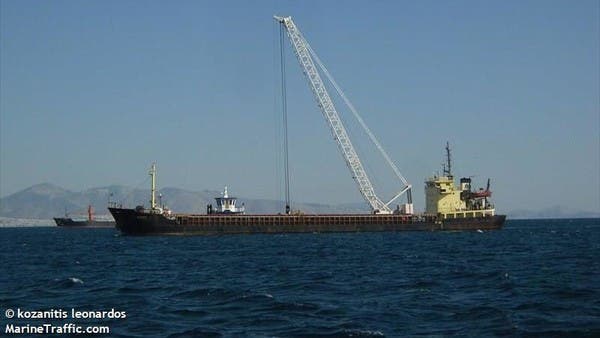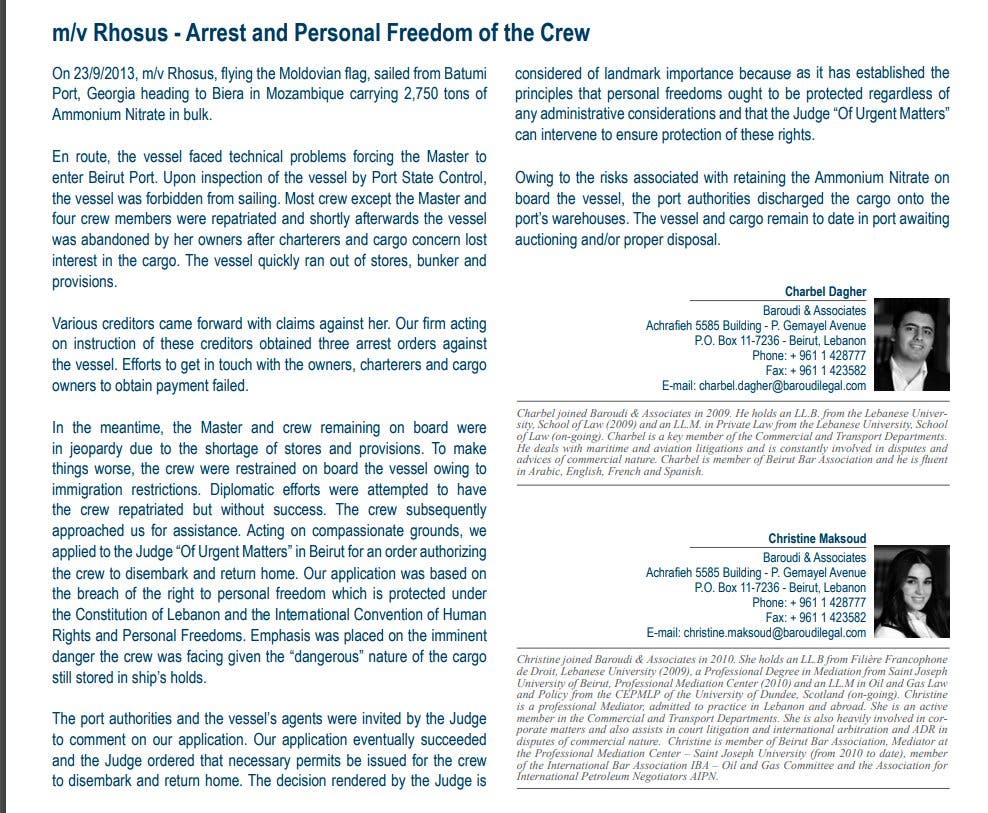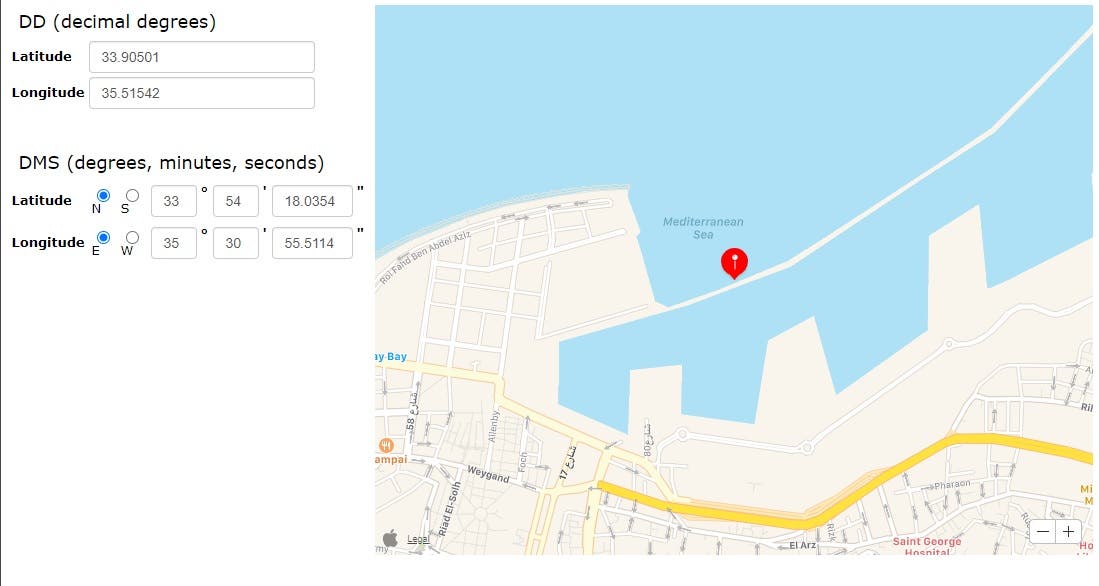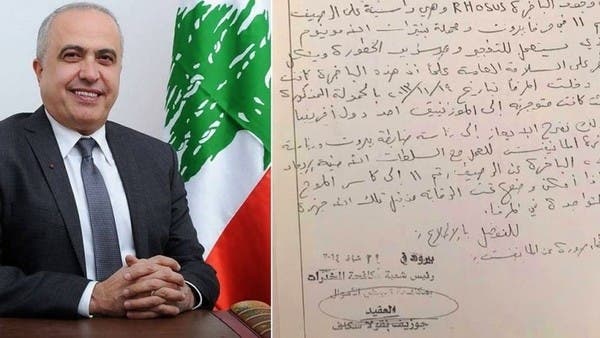
The abandoned Moldovan-flagged Rhosus tanker pictured in October 2013. (Photo credit: Kozanitis Leonardos via Marrine Traffic)
Ismaeel Naar, Al Arabiya English Thursday 06 August 2020
Explosive material that may have been the cause of the devastating blast in Beirut on Tuesday had been stored in the port since 2013 after a tanker was impounded there, according to a verified legal note circulating online.
Authorities have pointed to large quantities of the highly explosive ammonium nitrate as the cause of the massive blast that killed over 135 people and injured thousands in Lebanon's capital on Tuesday, but observers have asked where this material came from and why it was being stored in such large quantities so close to densely populated central Beirut.
Read more: Blame game for Beirut blasts begins among Lebanon officials
Based on a verified legal note from a Lebanese law firm, one theory has emerged that the blast was caused by 2,750 tons of ammonium nitrate that was offloaded by a Moldovan-flagged tanker in 2013 and had been kept in the port ever since.
Lebanese law firm Baroudi & Associates drafted the note after issuing three arrest orders against the Rhosus tanker, which was impounded by Lebanese authorities in November 2013 and subsequently offloaded the ammonium nitrate in Beirut port.
The letter, dated sometime in 2015 and posted online by two lawyers from the firm acting on behalf of “various creditors,” detailed what happened to the Rhosus after its Ukrainian crew and Russian owner abandoned the vessel off Beirut.
For all the latest headlines follow our Google News channel online or via the app.
Satellite images released the day after a devastating explosion erupted at #Beirut port show a portion of the land - where a warehouse that housed 2,750 tonnes of ammonium nitrate exploded - carved out due to the sheer force of the blast.https://t.co/8KYzX25cnr pic.twitter.com/U8lQjBOIUA— Al Arabiya English (@AlArabiya_Eng) August 6, 2020
“On 23/9/2013, m/v Rhosus, flying the Moldovian flag, sailed from BatumiPort, Georgia heading to Biera in Mozambique carrying 2,750 tons of ammonium nitrate in bulk. En route, the vessel faced technical problems forcing the Master to enter Beirut Port. Upon inspection of the vessel by Port State Control, the vessel was forbidden from sailing. Most crew except the Master and four crew members were repatriated and shortly afterwards the vessel was abandoned by her owners after charterers and cargo concern lost interest in the cargo. The vessel quickly ran out of stores, bunker and provisions,” read the legal note published by the lawyers identified as Charbel Dagher and Christine Maksoud.
The legal note in question has been verified by Al Arabiya English after its initial publication in a newsletter published in October 2015 by ShipArrested.com, a website that identifies itself as an extensive network that facilitates the fast and efficient arrest or release of ships with coverage in over 1,000 ports around the globe.

Legal note from Lebanese law firm Baroudi & Associates acting on behalf of “various creditors” against the Rhosus vessel. (Photo via ShipArrested.com)
“Various creditors came forward with claims against her. Our firm acting on instruction of these creditors obtained three arrest orders against the vessel. Efforts to get in touch with the owners, charterers and cargo owners to obtain payment failed,” both Dagher and Maksoud said in their legal note after the ship was impounded by authorities.
A heatmap of the “Rhosus” cargo vessel that reportedly offloaded the 2,750 tons of ammonium nitrate at Beirut Port in 2013 showed its past routes across the several countries in the Mediterranean prior to its abandonment in the Lebanese capital a year later, according to ship tracking service Marine Traffic.
Lots of talk about the Rhosus, its movements in 2013 and 2014, and its possible involvement in yesterday's explosion in #Beirut. We've put together a heat map of the vessel’s movements during that time period.#BeirutExplosion pic.twitter.com/zzeDKRRcwY— MarineTraffic (@MarineTraffic) August 5, 2020
According to the legal note, both Lebanese lawyers Dagher and Maksoud attested that Beirut port authorities had discharged the cargo of ammonium nitrate onto the port's warehouses.
“The vessel and cargo remain to date in port awaiting auctioning and/or proper disposal,” Dagher and Maksoud wrote in the conclusion of the letter released in 2015.
Al Arabiya English could not independently verify whether the 2,750 tons of ammonium nitrate that was offloaded by the Rhosus in 2013 or 2014 was behind the devastating explosions on Tuesday at Beirut port from hanger 12.

Map shows the last recorded location of the Rhosus in 2014 located opposite the hanger which exploded in Beirut port on Tuesday. (Photo via GPS Coorindates)
According to information provided by Marine Traffic, the last recorded location of the Rhosus was located at Mediterranean at position 33° 54' 18.036" N, 35° 30' 55.512" E as more than six years ago on August 7, 2014. The GPS coordinates placed the Rhosus docked exactly opposite the hanger which exploded on Tuesday at Beirut port.
While the Rhosus sailed under the Moldovan flag, it was actually owned by a Russian man named by Igor Grechushkin and was manned by a crew of both Russians and Ukrainians. According to an investigation by the Globe and Mail newspaper, Grechushkin’s known address was placed in Cyprus. The Siberian Times, Grechushkin still lives in Limassol, Cyprus, with the newspaper posting reportedly exclusive images of him.
Colonel who died suspiciously had asked for removing ammonium nitrate: Lebanese media

Former Chief of the drug control division at the Lebanese Customs Colonel Joseph Skaf (L), and signed 2014 document (R) warning of the danger of the 2,750 tons of ammonium nitrate at the Port of Beirut. (Al Arabiya)
Tuqa Khalid, Al Arabiya English Friday 07 August 2020
A Lebanese official who died under suspicious circumstances in 2017 had called for the removal of the 2,750 tons of ammonium nitrate which arrived at the Port of Beirut in 2013, according to a 2014 document shared by Lebanese media on Thursday.
Colonel Joseph Skaf, Chief of the drug control division at the Lebanese Customs, wrote at the time: “We inform you that this division received information about the presence of the Rhosus ship at the Port of Beirut. It is loaded with ammonium nitrate, which is used in explosives, is highly dangerous and constitutes a threat to public safety.”
He asked the authorities to move the ship away from the port’s docks and to place it under supervision, according to the document.
Skaf died in 2017, but the cause of death wasn’t determined definitively as there were two conflicting autopsy reports.
Major Lebanese newspaper an-Nahar reported at the time: “Did the retired Colonel Joseph Skaf’s foot slip or was he thrown off a height of three meters? A question which remains unresolved, especially after the two contradictory forensic reports commissioned by the Public Prosecution from two medical examiners,” citing a source in Lebanon’s Internal Security Forces (ISF).
The ISF source said at the time: “One of the two reports rules the incident an accident, and the other confirms that it was deliberate due to finding bruises on the deceased’s head.”
The ammonium nitrate stockpile at Port of Beirut exploded on Tuesday, killing at least 137 people and injuring more than 5,000.
Lebanese President Michel Aoun said the explosion was due to the stockpile being stored at the port for years without safety measure
No comments:
Post a Comment